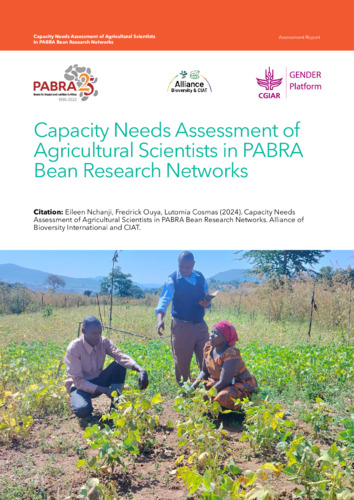Capacity needs assessment of agricultural scientists in PABRA bean research networks
Sub-Saharan Africa (SSA) has inadequate scientific capacities essential for driving innovation processes for solving the inherent challenges of low agricultural productivity, climate change, food security, malnutrition, and gender equality in agri-food systems. Developing new and strengthening existing capacities is crucial for food system transformations in the region.Capacity building promotes agricultural research and development and enhances gender equality and social inclusion in the agricultural development process. A rapid capacity needs assessment was conducted during “in-country PABRA events” to identify areas of capacity needs for national agricultural research organisations’ scientists.
This report provides the results of the needs assessment survey, which was conducted by 30 agricultural scientists from 16 Pan-Africa Bean Research Alliance (PABRA) countries in SSA.The aim was to identify the technical and non-technical training skills and knowledge needed by agricultural scientists in SSA. This ensuresthat PABRA delivers the required skills to these scientists. The result reveals that most scientists hold master’s degrees (53%), which indicates the need for advanced training for agricultural scientists. Proposal development skills and gender transformative approaches were identified by scientists as the highest priority in technical areas. Communication and leadership skills emergedas the most critical non-technical skills required. There were, however, differences with regard to age and region, suggesting the need to tailor training programs based on age and region. Training programs should also be aligned with the needs of scientists for efficient and effective service delivery for the realisation of sustainable development in the agricultural sector in Africa.
By investigating the technical and non-technical training needs, the survey seeks to guarantee that the planned training content is relevant and transformative and enhances participants’ professional growth and development. This will ensure that scientists advance their agricultural research agendas, contribute immensely to scientific innovations, promoting agricultural productivity leading to the well-being of the farming communities in SSA.

